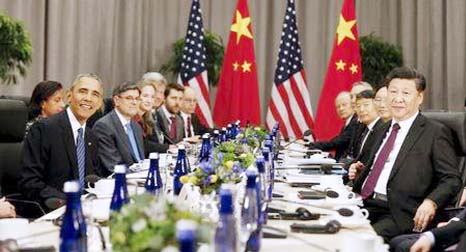
Reuters, Washington :
US President Barack Obama said on Thursday he and Chinese leader Xi Jinping are both committed to the denuclearization of the Korean Peninsula and that he planned to discuss human rights, cybersecurity and maritime issues with Xi.
Appearing with Obama on the sidelines of the Nuclear Security Summit in Washington, Xi said China and the United States have disagreements in some areas, but have effective coordination on the North Korean issue.
Meeting on the sidelines of a nuclear security summit in Washington, Xi and Obama agreed to step up cooperation to ensure nuclear security worldwide and to do more on cyber security. They also agreed to continue to work on a bilateral investment treaty, China’s assistant foreign minister, Zheng Zeguang, told a news briefing.
But Zheng made clear that China and the United States remained at odds over the contested South China Sea, where Beijing’s broad territorial claims have riled its neighbors, and over U.S. missile defense plans following North Korea’s recent nuclear and rocket tests.
Xi told Obama that he hoped Washington would “strictly” abide by its commitment not to take a position on sovereignty issues and instead play a constructive role to maintain peace and stability, Zheng said.
“The hope is that all parties will correctly view and handle the South China Sea and adopt an objective and impartial attitude … particularly countries outside this region,” he said.
China’s official Xinhua news agency also quoted Xi as warning that China would not accept violations of its sovereignty in the name of freedom of navigation – a reference to air and naval patrols the United States has conducted within what China considers its territorial waters.
China claims most of the South China Sea, through which about $5 trillion in ship-borne trade passes every year. Neighbors Brunei, Malaysia, the Philippines, Taiwan and Vietnam also have claims.
The United States says it takes no sides in the disputes but wants to ensure free navigation. It has said it will increase what it calls freedom-of-navigation operations by its Navy ships through the waters..
US President Barack Obama said on Thursday he and Chinese leader Xi Jinping are both committed to the denuclearization of the Korean Peninsula and that he planned to discuss human rights, cybersecurity and maritime issues with Xi.
Appearing with Obama on the sidelines of the Nuclear Security Summit in Washington, Xi said China and the United States have disagreements in some areas, but have effective coordination on the North Korean issue.
Meeting on the sidelines of a nuclear security summit in Washington, Xi and Obama agreed to step up cooperation to ensure nuclear security worldwide and to do more on cyber security. They also agreed to continue to work on a bilateral investment treaty, China’s assistant foreign minister, Zheng Zeguang, told a news briefing.
But Zheng made clear that China and the United States remained at odds over the contested South China Sea, where Beijing’s broad territorial claims have riled its neighbors, and over U.S. missile defense plans following North Korea’s recent nuclear and rocket tests.
Xi told Obama that he hoped Washington would “strictly” abide by its commitment not to take a position on sovereignty issues and instead play a constructive role to maintain peace and stability, Zheng said.
“The hope is that all parties will correctly view and handle the South China Sea and adopt an objective and impartial attitude … particularly countries outside this region,” he said.
China’s official Xinhua news agency also quoted Xi as warning that China would not accept violations of its sovereignty in the name of freedom of navigation – a reference to air and naval patrols the United States has conducted within what China considers its territorial waters.
China claims most of the South China Sea, through which about $5 trillion in ship-borne trade passes every year. Neighbors Brunei, Malaysia, the Philippines, Taiwan and Vietnam also have claims.
The United States says it takes no sides in the disputes but wants to ensure free navigation. It has said it will increase what it calls freedom-of-navigation operations by its Navy ships through the waters..

